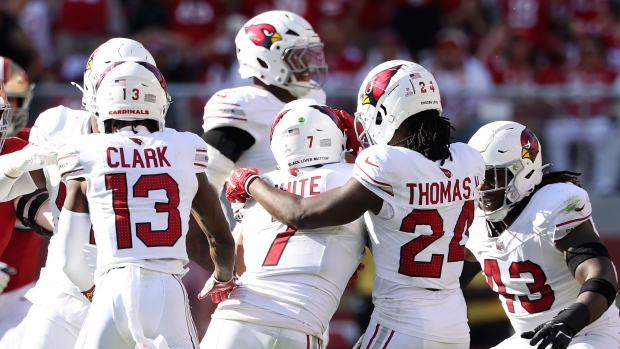Feb 16, 2025
What Cards' Robinson is taking from rookie year into offseason
Like most rookies, Arizona Cardinals defensive lineman Darius Robinson's first season was a crash course in all things professional football.
, ESPN

Robinson played in six games after suffering a preseason calf injury -- leaving him with minimal game time to discover what NFL football was all about. Despite playing in about one-third of games, Robinson walked away from his rookie year pleased with his accomplishments, finishing with 10 tackles, 1 sack and 1 tackle for loss.
"I'm really positive for this season," Robinson said. "Like, honestly, I'm proud of myself ... after everything I went through to go out there on Sundays and compete and just go from this and give me some good idea for the offseason where I need to work at.
"So, I'm super excited."
Robinson achieved his football dreams after being selected with the No. 27 pick in the 2024 draft. He then suffered the calf injury in practice on Aug. 22. Even though he was activated to the 53-man roster Oct. 29, Robinson didn't play his first snap until Dec. 1.
"He's had a lot going on this year," defensive line coach Derrick LeBlanc said.
In six games, Robinson learned quite a bit. His coaches learned a lot about him, too.
Even with the small sample size, coach Jonathan Gannon used one word to describe Robinson: "Disruption."
"He can make plays in the pass and run game," Gannon said. "That's why we brought him here. It's been awesome to see."
Starting his rookie season in Week 13 was no easy task for Robinson, LeBlanc said. However, Robinson tried to make the most of watching from the sideline.
When Arizona's offense had the ball in the games he missed, Robinson would follow the line of scrimmage up and down the field to watch the other team's best defensive players. In Week 3, Robinson had a front-row seat to watch the Detroit Lions' Aidan Hutchinson.
"I definitely learned a lot this year," Robinson said. "I feel like I kind of got redshirted in a sense. ... So, this was my redshirt freshman year."
His first game was overwhelming. LeBlanc said it seemed as if Robinson forgot everything the first time he was on the field against the Minnesota Vikings.
"Then the ball snapped and [it was like], 'Oh, crap, what do I do next?'" LeBlanc said. "So, I think that was kind of his experience the first game. Then after that, I think he settled pretty good. I think he kind of got it all out and [was like] 'Coach, I'm ready to go now.' And from there he has only gotten better, man. So, I think that first one was probably the worst one for him."
Arizona limited Robinson's snaps early on because he was going too hard and tiring himself out, LeBlanc said.
Once Robinson got settled, it didn't take him long to figure out the NFL.
"When you hit the bags, the bags don't punch back," Robinson said with a smile.
His development on the field was twofold. He was learning how to rush the passer while learning how to defend the run. Each, as he found out, had its challenges.
In six games, Robinson got more physical against the run, better understood the game's speed and started handling double-teams better, LeBlanc said.
Gannon said some of Robinson's plays against the run will go "unnoticed." As an interior pass rusher, Robinson learned the importance of winning reps.
"I got to do a better job ... of my rush angles, my plan, and just keep attacking," Robinson said. "These guys are really good, so I just got to get better."
Robinson wants to focus on his body this offseason, rebuilding it, getting bigger and improving his mental health. Getting bigger is key for Robinson to help him take control at the line of scrimmage, LeBlanc said.
The lineman also wants to improve as a pass rusher in the offseason, but LeBlanc said the most productive way to hone those skills is to do it in a game.
"It's the game reps that make you better," LeBlanc said. "So, I think in every aspect, his speed, his power, learning how to rush well-coached offensive lineman in the NFL, the mental piece of it is what he's got to learn. The physical part he's got."
Robinson knows he can play at the NFL level, defensive coordinator Nick Rallis said. Once he masters the mental aspect and marries it with the physical, he'll be able to play faster.
"If you have, at all, any kind of hesitation or processing that's making you slow up, you're not going to be your best," Rallis said. And that takes time, right? That's a lot of bank reps.
"So, the more that continues to build ... you'll see those plays where he lets his physicality take over."
